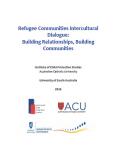Refugee Communities Intercultural Dialogue: Building Relationships, Building Communities
Attachments

Introduction
This study was designed to provide in-depth and contextualised data about how services may better support refugee parents to care for their children. It adds to the developing evidence base of what works with families, children and young people with a refugee background and provides evidence about how to best support positive parenting and family relationships. It also provides new evidence of how families perceive and draw on different supports, networks and connections in order to support them in their resettlement.
Research Aim
The aim of this study was to develop an understanding of the formal and informal sources of social supports, resources and connections required by refugee parents and their children to support positive parenting and family relationships.
Methodology
Two methods of data collection were used in the study:
- 50 semi-structured, face‑to‑face interviews with 25 families (one parent and one child per family) with a refugee background living in either SA or the ACT, and
- a national online survey with Commonwealth funded service providers working with refugee families.
Key Findings
The study found that the majority of parents and children, whilst experiencing significant disadvantages and sometimes complex issues, were also remarkably resilient and positive. The key issues facing families were the cultural differences in parenting practices and the challenges that these presented; the difficulties children experienced learning to live bi‑culturally; and the concerns parents had about their children living in a new country.
Service providers described the following programs and interventions to be the most effective in supporting positive family relationships with families from a refugee background.
- Parenting programs
- Case management and case work
- Activity and support groups
- Therapeutic interventions
Service providers emphasised the following characteristics of effective service delivery important in supporting positive family relationships.
- The availability of bilingual workers and translated written materials
- The development of trusting and respectful relationships between workers and clients
- Services that are free of charge
- The provision of regular contact and follow up
- Allowing time for clients
- Holistic assessments
- Providing unconditional positive and warm regard
Information about Research to Practice Series on the Australian Catholic University website.
Last updated:
